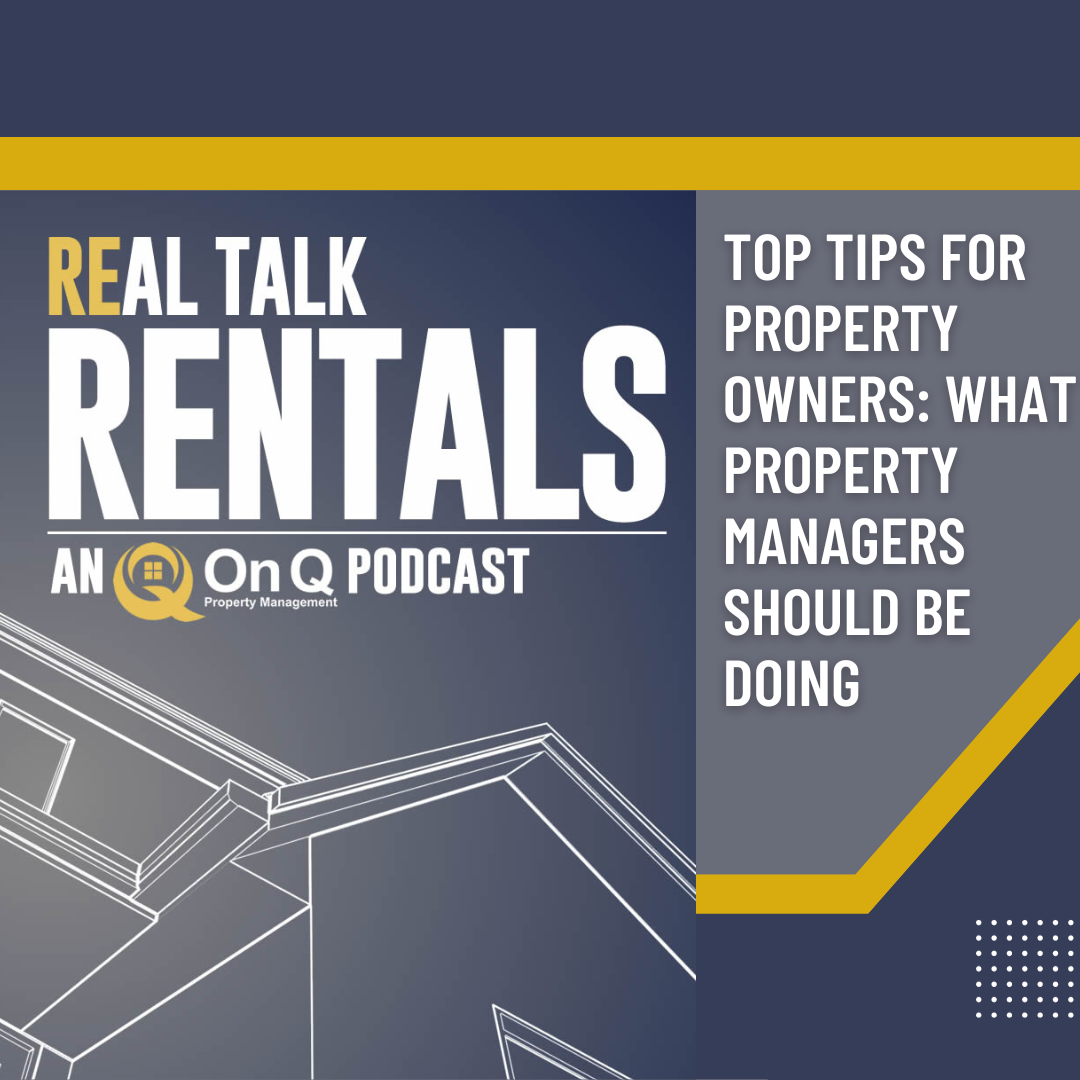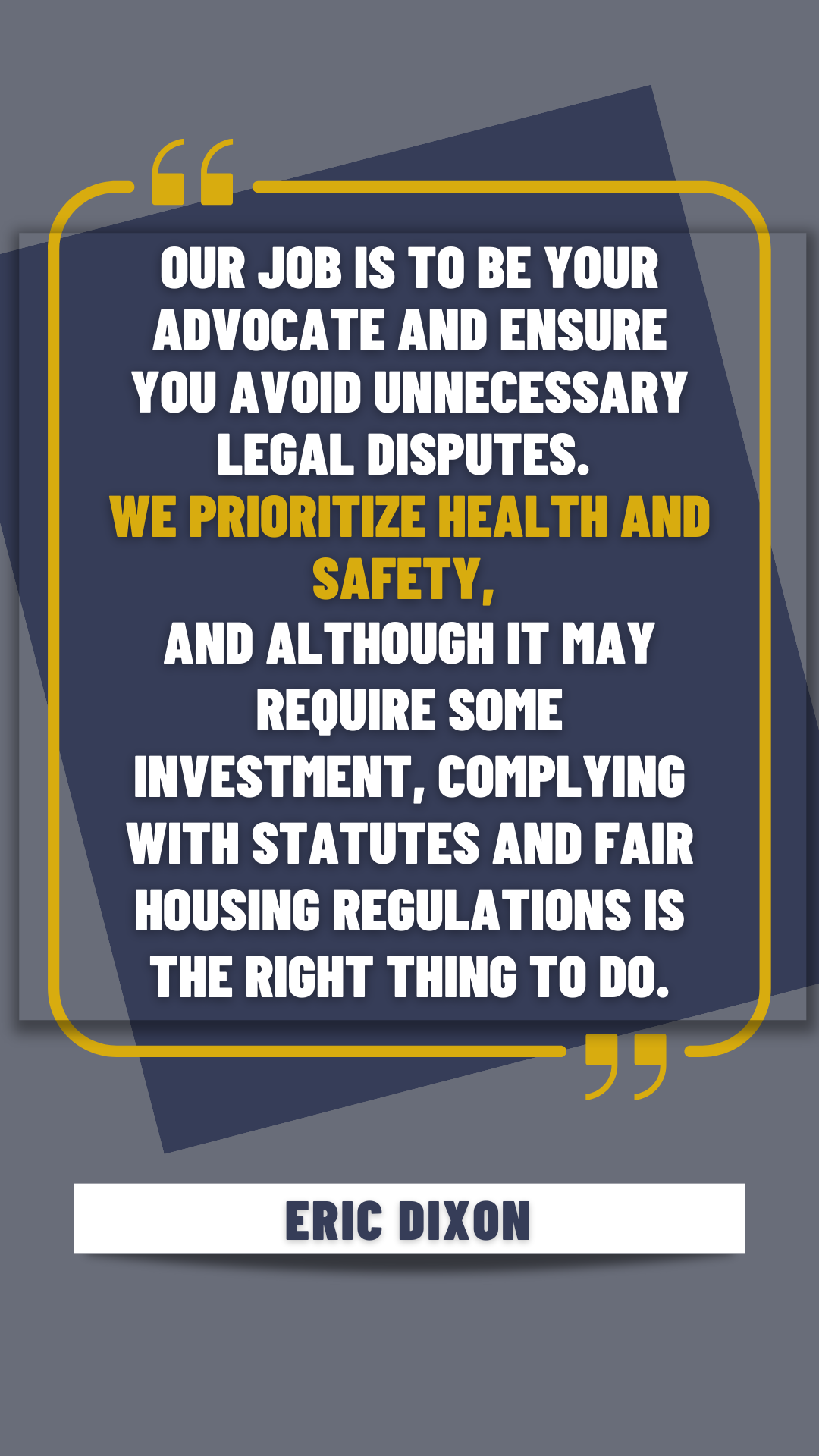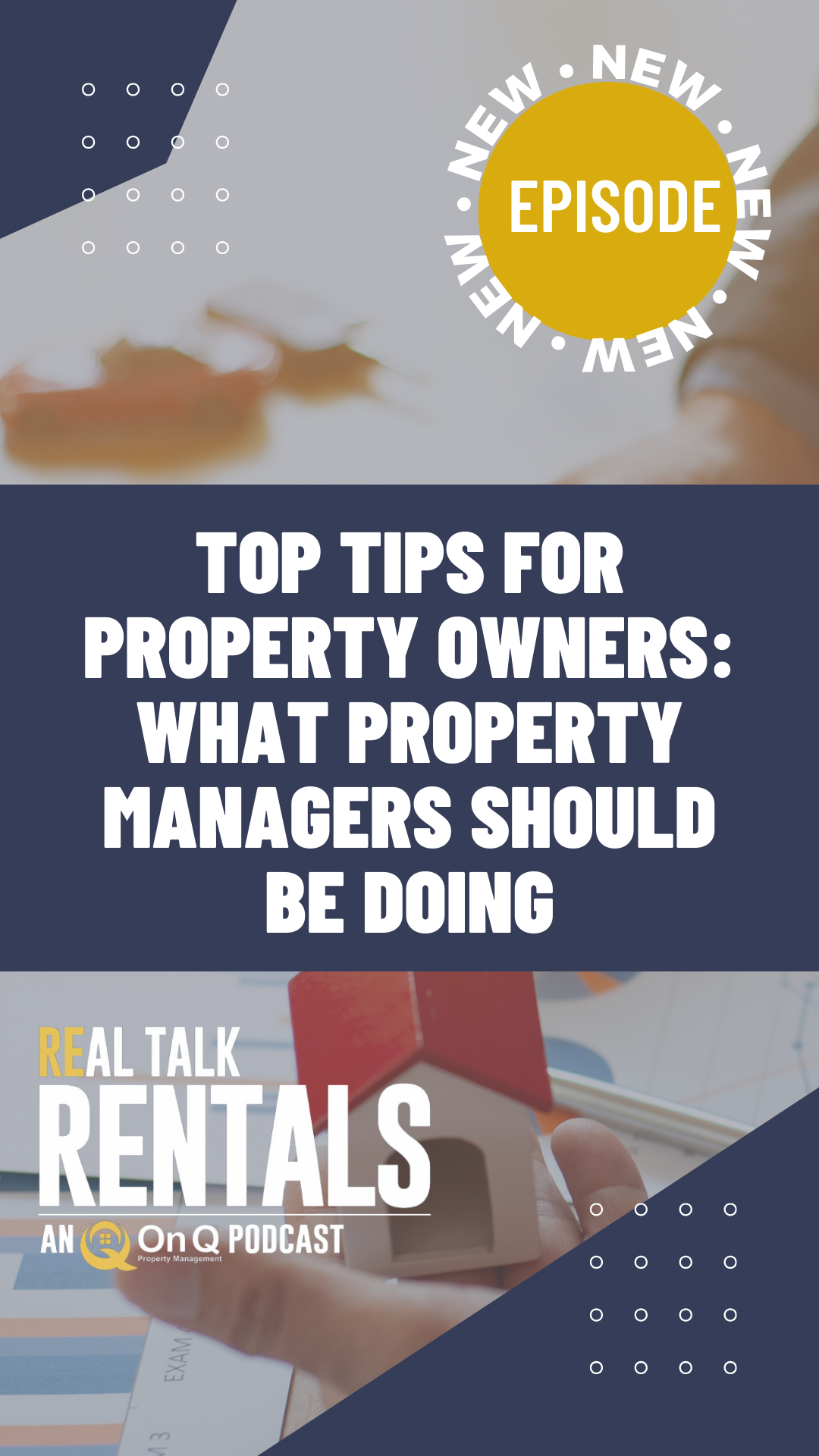REAL TALK RENTALS
Episode 28: What Property Managers Should Be Doing
Are you a property owner looking to get the most out of your rental properties? Tune in to this episode of Real Talk Rentals and learn from Ben and Eric, as they discuss the top 3 things property management companies should be doing to best serve their owners. Get all the insider advice you need to know for how to manage your rentals right now!
Additional Resources at onqpm.com
Connect with On Q on Facebook – Twitter – YouTube
Connect with Eric Dixon on LinkedIn







Interested in Learning More About Property Management?
Episode Transcript ExpandTop Tips for Property Owners: What Property Managers Should Be Doing
Ben Bailey: Coming up on today’s episode of Real Talk Rentals, we’re going to talk about the top three things your property management company should be doing for you. Welcome back to Real Talk Rentals, a podcast brought to you by Oncue Property Management. We’re here to give you all the tips and tricks that go into owning a rental property and the behind the scenes scoop on property management. I’m Ben. I’m your host. With me as always, my co-host, Mr. Eric Dixon, the go to expert on all things rental property and real estate out here in Arizona. And in this episode, we’re going to do Everybody Loves a List, so we’re going to hop into another one of those lists. We’re going to do the top three things a property management company should be doing for you. You’ve hired someone. This is the bare minimum of what you should expect, right?
Eric Dixon: Yeah. All right.
Ben Bailey: So let’s, uh, let’s just kind of divide them up then and go. One, two, three. So what is, Eric, the number one thing a property management company should be doing for you?
Eric Dixon: Well, the we get asked all the time to like, what do you guys do besides collect rent? Yeah. You know, and I’m like, actually, that’s the number one thing we do. Yeah, we collect the rent, but think the understanding people have is different. Do you just collect the rent and then you, like, pick up the physical check and deposit it in the owner’s account or what? What happens? So when we are going through it, it’s like collecting rent is this big umbrella of, of things. It’s, you know, accepting the payment. So that’s whether, whether it’s check we don’t take cash. But guess some property management companies may take cash.
Ben Bailey: Seems like a bad idea.
Eric Dixon: Yeah, we used to. And it was just a pain, man. Yeah. It’s like, no, I brought that yesterday. It’s like, you know, so it’s he said, she said. And yeah, having cash just in your, in your business is tough. So we do a ton of online payments. So you know, through a portal they’ve got to have a way to pay online. So one of the questions you should ask your property management company, if you’re interviewing them too, too is do you accept payment online? If they don’t, and they’re like, sorry, it’s paper check. You got to come in the office or mail it in Red Flag. Yeah. Um, you got to find a way to track the tenants ledger and the owner’s ledger. So that’s part of collecting rent, right? It’s. I collected the rent. I put it on the tenant’s ledger to cover all the charges. Then. Then it’s double accounting, goes to the owner and shows all of the income coming in and all the expenses going out. Sounds pretty simple, but that’s a bare minimum. Yeah, and.
Ben Bailey: It’s it’s something you don’t think of when it comes to like thousands of dollars coming in. It’s like, yeah, they’re collecting the money from you, but you should be able to track all of that.
Eric Dixon: What I can tell you from like a self managing landlord in the past, collecting cash from my four plexes and stuff, and then it’s like it just becomes it goes in an envelope and then I’m like, Oh, I’ll track it on a spreadsheet. And then like months go by and you’re like, didn’t don’t really keep track of it.
Ben Bailey: The first apartment I lived in when I got married was in downtown Huntington Beach, little like bungalow we rented from the people in front of us. This older couple, super sweet. We paid cash and they just one month they were like, they forgot that.
Eric Dixon: We that you.
Ben Bailey: Paid. No, we forgot to give it to them. And then I was like, Oh, I’m sorry. And she’s like, Oh, you did? And I was like, Nope, nope. But could be stealing $1,000 from you right now. I’m not gonna do that. Um, but yeah, like, she was just all, you know, handshake deal. There was no lease or anything.
Eric Dixon: No. And it just becomes tricky. And it’s even just like, even if the payments are on time and stuff, it’s like you need to have whether you’re going to go sell the property or whether you’re going to do your taxes or whatever you’re going to do. You need some sort of ledger and payment system, right? So part of that is that your management company should also provide monthly and year end statements. So all income, all expense monthly. And then at the end of the year, you know, usually in January, um, part of collecting rent, you know in the air quotes I’m doing if you can’t see it is, uh, the ability to evict or do a partial payment plan or, and just know the laws of evictions and late rent if.
Ben Bailey: People aren’t paying.
Eric Dixon: So there is a management company here locally that they don’t handle evictions. So basically they give the owner a to do or like evict on your own type packet and it’s like, Hey, this is all you have to do. You know, call the attorney, you do it. But it’s like and so it’s one of those things like know your property manager should do the whole eviction if they don’t like you said, another red flag, right. Um, part of collecting rent too, is negotiating and doing the lease renewal. So it’s like you collect rent for 12 months or 24 months or whatever it is, and then, um, negotiating the lease renewal, getting the lease renewal signed and, you know, upping rent if necessary, or changing terms, whether you change landscaping or pool service or whatever it is. So they need to be able to do that. And then last but not least, collecting rent. So you imagine somebody just saying like, that’s all you do, Ben You just collect rent. Yeah. And you charge X amount a month. So it includes all of those things we mentioned, including managing it like a business, you know? And so I look at it like it’s not just collecting rent for a little rental. It’s like, No, you hired us to manage your business, your investment, your, your whole thing. So, sure, there’s no. Personal or emotional attachment. It’s just business to us. It’s like, no, we collect, the rent goes on the ledgers, you get your direct deposit, you get your statement, we’re on call 24 over seven. And that’s what collecting rent is. And so that list is basically what justifies the monthly management fee.
Ben Bailey: Sure, sure. Yeah. I mean, working here, you notice the first of the month, people are just coming in and paying the people that don’t do online. And it’s like, you know, they they come in and they might be like, that’s the opportunity to be like, Hey, I want to talk to somebody about this isn’t working or something. And then if you’re doing this yourself, that’s going to be your tenant coming up. Or it’s when you not.
Eric Dixon: You knock on the door and you’re like, Hey, I’m here to get the rent. And they’re like, Oh, I’m glad you’re here. Can’t come look at all the things wrong with the house. Yeah, exactly. Right.
Ben Bailey: So we’re that shield for you? Yeah. Hiring a property manager. All right. Um, bucket two, then what is the second thing a property management company should be doing for you?
Eric Dixon: So didn’t kind of mention it on purpose with collecting rent, but it’s handling maintenance. So it is. It is kind of separate from the collection of the actual money. And then but maintenance is one of the hardest things with property management, self managing whatever it is, because it’s unpredictable and it can be 100 bucks or it can be $20,000. Sure. And everything in between. It could be an insurance claim. It could be, you know, something crazy. So as far as what you need to expect from your property management company is they need to be on call 24 over seven. Right. In some way. You know, if they call it 2 a.m. and they don’t get a live person, that’s reasonable. But if there’s a voicemail left that they get a call right back, you know, or or whatever it is sometimes, you know, when I was on call back in the day, I was doing on call when I was the property manager. And, you know, I’d wake up or I’d let it ring. It’s 2 a.m. If they left a voicemail, I’d call them right back. If they didn’t leave a voicemail, oftentimes it was a wrong number. Somebody was just on our website just clicking around, just trying to find just trying to find something. And it’s like so but during business hours and while I’m awake, if it rings, you just answer it. But you know, if it’s three in the morning and you get that call and they leave a voicemail, it’s like, no, there’s there’s a fire flood. Yeah. Out in July, you know, something like that.
Ben Bailey: Usually they click around, they end up getting a sales guy if it’s not too late because they’re the ones that are always answering.
Eric Dixon: Oh yeah, they’re like a sale. Let’s go. Yeah. Oh, man.
Ben Bailey: 11 p.m. on a Friday. I’ll take the call. Yeah, absolutely.
Eric Dixon: Yeah. Um, and so part of maintenance is your the property managers facilitating between three parties, the owner, the tenant and then this contractor or vendor. Sure. And so they need to have the ability not only to verbally do it and by email, but have some sort of platform to communicate your invoices, your pictures, your before and after pictures, the, you know, the work order and that sort of stuff. They should also have a proven and vetted list of vendors. Oh, yeah, like your property manager all the time. You know, they they should if there’s a leak, it shouldn’t be like, hey, our plumber is busy. Yeah, well, what about the backup and the backups?
Ben Bailey: Backup and or be like, Google me some phone numbers and send them back and I’ll call. It’s like, no, you should have those numbers.
Eric Dixon: Yeah. So they shouldn’t. Shouldn’t just be that us as the management company are using somebody for the first time. And your property is the guinea pig, right. You know it should be. Hey, we’ve used these guys before. There are, you know, they’re in our top tier of people. We kind of know their pricing. We trust them, they’re vetted. They’ve done criminal background checks on their technicians, you know, whatever it is, right? So whatever those those bare minimum things are, you know, Um, and then the last thing with maintenance is determining to make sure the responsibility is right. Like, is this an owner expense issue or a tenant expense issue? And so a lot of times when the tenant makes the call and says, hey, my disposal this has happened to me personally is they say, hey, the disposal doesn’t work. And I’m like, All right, cool. That’s obviously mechanical error. I would be responsible if they find, you know, a toy in there that’s a tenant issue. So they went down there and they found a shot glass all jacked up and shards everywhere in the disposal.
Ben Bailey: Happens.
Eric Dixon: Often. And and the tenant’s like, Oh, dude, I didn’t know that fell in there. Yeah. And they the tenant was responsible for the replacement of the, the now broken, you know, disposal. So as the owner I was like, oh sweet. I don’t have to pay whatever cost it is to replace it, but man, that sucks for the tenant, but it’s their fault, you know? And so I went into it thinking, oh yeah, I’ll absolutely pay for it. And then they came back and said no. The property manager determined that it’s a tenant responsible issue.
Ben Bailey: Yeah, and we talked about this so many times, but it’s, it’s so important is that the company is kind of that um, they take the emotion out of it. They’re, you know, no objective. They’re just looking at the facts and saying because you own this, you might walk in and like you said, be like, this thing was working perfectly. I know. It was like they did something to it. And it might not be that simple, you know, And having someone who will look at it objectively and say, no, actually this person needs to pay or.
Eric Dixon: You need to pay well, and sometimes we have to give bad news to the owner. Sometime it’s bad news to the tenant and sometimes it’s both. You know what? What sucks is maintenance in general sucks for both parties. And really what your property manager should be doing is making it suck a little less. Sure. Just. Just a little bit. It should be. It should be. Hey, it’s going to cost you the same. You got to hire somebody to do it. But maybe you didn’t have to deliver the bad news to the tenant that, hey, sorry, your AC is not going to be fixed till tomorrow. You know the parts coming in or. Hey, sorry, you’re not going to have hot water until, you know, after the weekend because there’s not a plumber that’s available or whatever. And your property manager should know how to do that and communicate. And so if your if your property manager can make it suck less, then they’re doing a good job.
Ben Bailey: And we should note that some property management companies, we don’t, but there are ones that do and it just depends. There are ones that charge per maintenance. Per maintenance for some. Yeah. Yeah. Well, some.
Eric Dixon: Of them are like, oh, we charge the tenant and it’s like, you know, what’s going to happen is the tenant’s just not going to call in maintenance. Exactly right. And you’re going to get a property that’s like everything’s leaking, there’s damage, and you’re like, What the heck happened? And the tenant? The tenant didn’t want to pay 50 bucks or a hundred bucks every time something broke. Sure.
Ben Bailey: And I think that’s the advantage, too. Just to piggyback on this, a full like full service like we do in a lot of companies do. But having those inspections because yeah, a tenant might be like, Dude, I know I dropped a shot glass down there. I’m just going to live without a car.
Eric Dixon: I’m going to live without a disposal. Maybe they’ll charge it out of my deposit, whatever. Yeah, but then if they do that to five things, the deposit doesn’t cover it, you know? And so it’s just like. And your house is getting neglected and, you know, all these, all these things.
Ben Bailey: So. So a lot of times, you know, maintenance, having someone that goes in there and catches it, you know, and sees those things is a huge and that’s a whole separate thing. But yeah, just reminds me, when we talk about those responsibilities.
Eric Dixon: Well, we take a I just thought of the we take over leases from another management company and we’ll take it over because they’re having a hard time at this other company. So we we bring them on and we get the lease and it says something like, the tenant is responsible for the home warranty service call and it’s like they’re.
Ben Bailey: Never going to do that.
Eric Dixon: They’re never going to do it. Number one, home home warranties are horrible. Number two, why are they going to pay out of pocket if it was just like a mechanical failure? That’s the landlord’s responsibility. Yeah. And the landlord’s sitting there like, oh, I love it because I don’t have to pay the fee. But what happens is it’s just neglected. You’re paying.
Ben Bailey: Through the different way.
Eric Dixon: And so you’re going to pay in a different way all at once rather than pay a little service fee like pay pay to get that water heater fixed Now, instead of the tenant will say, well, if I have to pay the service fee, maybe I’ll just try and fix it myself. Yeah. And it’s like, Dude, they’ve got a wrench on the water heater and yeah.
Ben Bailey: I’ve got a buddy that down the street that says he knows how to fix it. Put some tape on it.
Eric Dixon: It’s good. That’s what happens, you know. And so then when we renew those leases, we have to have these conversations with the owner. That’s like, Hey, look, we’re taking that home warranty thing out of there. Not good. Here’s why, you know, it doesn’t protect you, saves you 75 bucks here and there just for you to spend hundreds of dollars later to fix it.
Ben Bailey: Yeah, exactly. All right. Number three, the last in the top three. The number three thing that they should do.
Eric Dixon: Is your property managers should fill your vacancies. So we say it all the time. I mean, it’s like over and over and over. But vacancy is the most expensive line item on your on your expense sheet, on your balance sheet with, with rentals. And so they should be able to not only fill your vacancy but fill it with a qualified good tenant that’s been background checks, credit checks, sex offender checks, eviction history, landlord history, you know, and meets all those criteria. Right. So it could start it does start as early as pictures, the lock box, the sign, the digital marketing, the third party websites, you know, all of that stuff. But then it’s those leads come in. It’s like a funnel. You know, you’ll get like 300 leads and then maybe 20 are interested, ten see the house, five apply and then you get the best applicant. Like there should be a funnel of, you know, a sales funnel or a sales process for that to happen. Um, you know, with us we have, you know, a team of leasing agents. So if one’s at lunch or one calls in or one’s on vacation, you know, you’ve got you’ve got a team that’s handling these high volume of leads. They’ll schedule showings. We do, you know, self showings. We do different different things.
Ben Bailey: By far, our busiest phone department is the lease. And like it rings nonstop.
Eric Dixon: It’s nonstop. And some questions are just silly. And, you know, it’s a it’s a hard, repetitive on property management. How can I help you type deal. And then yes, that is the price that you’re looking at. Yeah. On Zillow when you call.
Ben Bailey: No, they will not take half of that. But thank you.
Eric Dixon: But it is it’s funny though, but some of those every one of those calls, that person is interested in housing. So it’s like we try and get them and funnel them into into our our housing. I kind of mentioned, you know, the criminal background checks, credit checks, all of that stuff that has to we have minimum standards. You’re. Property manager should have minimum standards. You should look at those before you sign on the dotted line. A lot of those aren’t going to be in the management agreement. It’s going to be a policy within the company. And for us, it’s full disclosure. It’s on our website. Anybody, tenant, owner, anybody can look at the qualifications and make sure they’re abiding by fair housing laws and know what they’re doing with animals or emotional support. Animals. Yeah, animals, The animals, animals. Um, but then, you know, once you get somebody qualified, your property manager should be executing the lease. They should be doing the moving inspection and documenting the property and they should collect the first month’s rent and the deposit and do all of those things to actually fill the vacancy, get the utilities out of the owner’s name, you know, and facilitating all that, exchanging keys, garage remotes. And I feel like I’m just forgetting one of the main things. But but filling that vacancy and preparing the owner to start receiving rent. Yeah. It’s the most fulfilling to me. And I joke with the leasing agents because they’re like, Hey, this owner is so tough, you know, they won’t lower the price. So they won’t do this, they won’t do that. And it’s like filling that vacancy will solve all of the landlords problems. And we just we have to remind them like, dude, don’t be, you know, splitting hairs here. Like as soon as that tenant moves in and you get that first rent check, you’re just like, Oh, yeah, that’s why that’s why we did this.
Ben Bailey: Yeah, exactly. And that’s why when we present applications, we don’t. Give them all the nitty gritty details because we don’t need you know, you don’t want the owner to be like, I was really hoping a family would live there or I was really hoping, you know, like and not in a malicious way. You know, just a lot.
Eric Dixon: Of their questions are, are they married or are they do they have kids? And you’re like, doesn’t matter, dude. Like, we’re just trying.
Ben Bailey: To get somebody with fair.
Eric Dixon: Housing. It’s like, hey, as long as they meet the criteria and after they’ve been through it, once our clients are great with the next time around, they’re like, No, I get it, man. Like, it didn’t matter. A lot of them want to know their name so that they can guess their ethnicity or their. Yeah. Or are they married? Are they going to are they going to have kids and trash my house? And you’re like, Oh yeah, we need to have a conversation about that.
Ben Bailey: Or they want to do their own detective work and, you know, look them up on Facebook or see if they’re a sex offender. And it’s like, Hey, this is why you’re paying us. Yeah, yeah, we’re doing all that.
Eric Dixon: So a lot of it is just like you and I are talking and trying to educate the listeners. That’s what we do every day is the property managers. They’re strictly just educating our clients and the first time around is always the trickiest and then the second and the third and the fourth. They’re like, Oh yeah, trust the process. You know? You got qualified tenants in there, the credit, the income, everything checked out. They moved out and and we’re ready to do it all over again. Right?
Ben Bailey: Okay. So let’s say. Yeah. Ready to hire a property management company. All three of those boxes are ticked. You go through, they do all those things. You’re comfortable with them. What other things? You know outside of that top three. What are the other things that you think are worth digging into and considering?
Eric Dixon: Yeah. So as far as considering, you want to kind of see what other companies ancillary services are. So like whether they have any sort of insurance for eviction protection, like an eviction protection insurance, Hey, if there’s an eviction, am I paying cash out of pocket? Right. Can I pay a fee or a percentage or a flat something to to have coverage That’s pretty popular. I would ask about inspections. So what’s included, you know, is the move in the move out routine inspection, spot inspections, Filter changes.
Ben Bailey: Filter changes are so huge out here. I no, they’re not in other states, not as much, you know, but man in Arizona. No, It’s.
Eric Dixon: Funny that you say that. We go to like a conference or something and people are like, Oh, you guys do filter changes. Like they actually physically go in and change the filter. And I’m like, Yeah, I mean, that’s one of the services. They’re like, We change our filters maybe once or twice a year, maybe, yeah.
Ben Bailey: And it’s like, Man, out here, that thing’s pumping. You have to change it. We had a guy who worked for us for a while doing AC and he was like, We don’t need to do these filter things. I’ll bet you $100 that these tenants change them every month. And I said, I will take that hundred dollars because there is no way.
Eric Dixon: He the same guy. So we’re talking about the same person. Yeah, he will not be named, but he is one of our techs. But then they do a what did we call them, AC tune ups, you know, every spring before the summer and they go do the tune up and they pull out the filter that they put in last year’s tune up. Yeah. And it’s just caked, dude.
Ben Bailey: It looks like a wool sweater, just like, stuck up there.
Eric Dixon: And he’s just like, Oh yeah, that’s the reason your AC is inefficient because they’re. Yeah. Trying to suck a sweater through the return register.
Ben Bailey: You know it’s, it’s, yeah. Definitely out of sight, out of mind for especially so many people are moving in you know it could be their first time in Arizona.
Eric Dixon: Yeah.
Ben Bailey: Yeah. First time they just moved here and.
Eric Dixon: I own my home. I own a property management company. I’ve been in the business for ten plus years and I don’t change my filter every month like I should. So I’m telling you, your tenants don’t.
Ben Bailey: They’re not doing it.
Eric Dixon: Don’t do it. Yeah. And then the other ancillary services that you may consider depending on your house is stuff like pest control, landscaping or pool service. We highly recommend owners take care of the pool service. So in Arizona, again, another hot topic is pools, but landscaping. Usually you throw it on the tenant, but if your yard is very high, maintenance has a lot of grass needs, heavy watering, you know, a lot of trimming, it’s like it’d be better to bump up the rent a little bit and include a service of somebody you trust, right? Rather than let the tenant do it and they just let stuff die, you know? And then pest control service could be same thing. I mean, we’ve got scorpions here, we’ve got all sorts of different, different. So much different. Oh, yeah, I forgot. You hate scorpions. Oh, God. Oh, dude. Sorry I mentioned that dude. That’s triggered. Yeah, Yeah. Um, the last thing is, is just. It’s kind of the intangible, I would say, of you can’t really put it on a list of a must have or checklist, but it’s kind of the intangible benefit of having a property manager you trust. So we’ve even had some big portfolios we manage for and the number one thing that they see is like, Oh yeah, this stuff in writing fees, services, that’s great.
Eric Dixon: But they kind of close that and they go, Who are you? You know, they get to know you and you want that intangible relationship to be in front of everything because if you trust them, then if they don’t get a hold of you or we don’t get a hold of the owner and we have to make a decision for them, they’re like, No trust. Ben Dude, he’s my property manager. He’s been my property manager for five years. If he took an emergency call and that had to be done for the health and safety of my client or the tenant, I trust him. Like, getting to that point is the goal. So absolutely. A lot of times the day you hire us or another property manager that it’s not instant trust, right? It takes months and months and months and maybe years. And then something happens and you’re like, nah, did I get it? I trust you, you know? So I’d say that’s that’s the last thing that’s not on the the official list. Yeah. It’s the intangible like relationship.
Ben Bailey: It’s a big deal, I think, because right now, too, especially, you know, with technology and stuff, you see these companies that are coming up that are like, you don’t need a property manager. This app does everything or whatever, and that might work great for some people, but there is something to being able to like, Hey, I’m going to call Eric real quick and get his advice on this. Yeah. And you know.
Eric Dixon: They should be your advocate. They should be like, oh, no, like I’ve got your back. I actually have a phone call. I don’t know if they listen to this, but I have a phone call after this recording here with an owner that isn’t stoked about some of the fair housing laws and like different things. Right. And so my talk with him is more going to be, hey, look, part of our job is to be your advocate and keep you out of the courtroom. Keep you out of some you know, this is a health and safety issue we’re dealing with. And it’s like, dude, I promise you, we got to obey the statutes and the fair housing and you’ll it’s going to cost you a little bit of money to fix this thing that you don’t want to fix, but it’s the right thing to do. Yeah. And I’m hoping that months from now, years from now, whatever it is, he’ll look back and say, You know what, I’m glad on cue. Educated me on that and kept me out of the the spotlight of a fair housing issue, you know, And it’s like, Exactly. And so you really should have an advocate sometimes they’re hard conversations to have and it’s just like but.
Ben Bailey: It goes a long way just having a person to talk to. I think it’s kind of like this is an example I see all the time is. People. Yeah. Anybody could go look up what a law is, right? But there’s always somebody who’s like, Do you know a lawyer could like, isn’t your cousin a lawyer could ask him a question? Like, you just want to hear from a human, You know, you just.
Eric Dixon: Want to hear somebody like, say what you think is, Yeah.
Ben Bailey: And you might be in the wrong, but it’s like, yeah, I could read those words, you know, I could read the fair housing thing, but it’s like that guy wants to get on the phone and say, like, Eric, do I have to? What is this?
Eric Dixon: And somebody, to your point, somebody that’s in the industry of whatever law they’re practicing and they’ve had examples of like, Oh, yeah, dude. Hey, Ben, sorry you’re interpreting that wrong. There’s a case just like this. Last year the guy got reamed and you’re like, Oh, yeah, don’t want that.
Ben Bailey: Yeah. When I’ve lived in Utah, man, everybody had a cousin who was a lawyer. You know, everybody knows somebody and they’re always just like, Oh, let me call my cousin real quick.
Eric Dixon: It’s just like, who knows what and who’s most comfortable with. And that’s what this bring this conversation up I’m going to have this afternoon because it’s somebody that trusted us enough to hire us. We’re collecting rent. We’re we filled the vacancy. We’re doing these things. And then boom, something happens with the AC unit and, you know, just snowballed. And now they’re not mad, but they’re not super happy. And so it’s kind of like, hey, look, this is this is why it happened. I wanted to keep you out of the limelight. If this tenant would have called an attorney, you would have got reamed, you know? And so you lose. You lose. So we had to do this, you know, to keep you out of it. So it’s more of a you know, I feel like we’re being we’re being the owner’s advocate and saying, hey, look, we took care of the tenant, the tenants now happy, 100% happy. And it’s because we obeyed the statute and obeyed the law. Yeah, I know you don’t like the law, but I didn’t write the law. You know, I didn’t write the law. And and frankly, the judge is going to side with the tenant in this issue. So. So anyway, hopefully that helps. All right.
Ben Bailey: Well, I think that’s it. I think we covered it way more than three there because we listed so much at the end. But those those first three pay attention to those and they will help you out. And that’s it for us this time. So be sure to subscribe to the show and leave us a review if you can. It really helps out and we will see you guys next time.
Our Company
On Q Property Management is a full-service Property Management company specializing in managing residential rental properties. On Q’s client-first approach – utilizing a proprietary process and set of tools – delivers a more transparent and profitable property management experience. With year-long tenant guarantees and a no-fee cancelation policy, On Q is dedicated to earning you business month after month.
Arizona Designated Broker: Eric DixonTexas Designated Broker: Rodney Henson Texas Real Estate Commission Information About Brokerage Services
Texas Real Estate Commission Consumer Protection Notice





